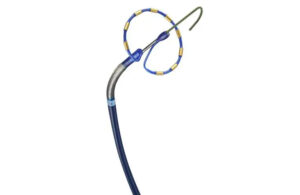
The analysis demonstrated positive results for the PulseSelect system, including atrial arrhythmia (AA) burden reduction. This correlated to both improved quality of life and decreased healthcare utilization.
Medtronic said in a news release that 87% of paroxysmal AFib and 82% of persistent AFib patients experienced less than 10% AA burden. The company presented results as late-breaking trial science at Heart Rhythm 2023.
The Pulsed AF trial evaluates the safety and effectiveness of PFA technology for AFib ablation. PFA uses pulsed electric fields to efficiently isolate pulmonary veins to treat paroxysmal or persistent AF. Medtronic completed enrollment in November 2021. Read more about what pulsed-field ablation is here.
Earlier this year, Medtronic said PulseSelect exceeded its safety performance goal in the clinical trial. PulseSelect registered an adverse event rate of 0.7% in the study. Medtronic said that marks one of the lowest adverse event rates of any previous FDA investigational device exemption (IDE) trial for AFib ablation or any multi-center PFA study.
Dr. Atul Verma, the principal investigator, said the results provide “a more holistic picture of patients’ arrhythmia experience.” Verma serves as an electrophysiologist and director, Division of Cardiology, at McGill University Health Centre in Montreal.
“Most novel is that this study shows us that treatment with the Medtronic PulseSelect PFA System results in low burden, which we know supports significant quality-of-life improvements and is something clinicians and patients consider when choosing a treatment option,” said Verma.
About the Medtronic PULSED AF study findings
Medtronic said the recurrence of known episodic AA depends on the monitoring strategy used. In PULSED AF, investigators calculated burden for every patient utilizing recording from trans-telephonic monitors (TTMs) and Holter monitoring. The study used an endpoint of AA burden, assessed by the greater amount of burden from Holter monitoring or TTMs.
Findings demonstrated 87% of paroxysmal AFib and 82% of persistent AFib patients showed a post-ablation burden of less than 10%. The study observed zero burden in 69% and 62% of those cohorts, respectively.
Additionally, Medtronic reported on quality-of-life metrics based on the AF Effect On Quality-Of-Life Questionnaire (AFEQT). Results came at baseline and 12 months post-ablation. Paroxysmal AFib patients had AA burden of less than 10% associated with meaningful quality of life improvement. Persistent AFib patients undergoing pulsed-field ablation experienced quality of life improvement regardless of burden level.
Medtronic also said that its analysis evaluated the relationship between AA burden and AFib-related healthcare utilization. That includes repeat ablations, cardioversions and ER visits/hospitalizations that occurred following pulsed-field ablation treatment.
For both types of AFib patients, repeat ablations and cardioversion significantly increased with increasing AA burden.
“Catheter ablation technology has been shown to reduce AA burden, and now we’re proud to be at the forefront of the next evolution in catheter ablation by demonstrating how novel pulsed field ablation with PulseSelect can support an advancement in meaningful improvements in quality of life,” said Rebecca Seidel, president of the Cardiac Ablation Solutions business at Medtronic.

